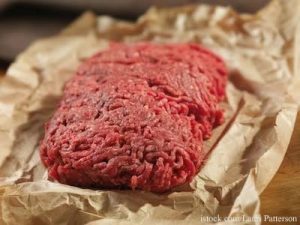An E. coli O157:H7 outbreak linked to ground beef produced by Wolverine Packing Company in 2014 sickened 12 people in 4 states. Ground beef can be contaminated with pathogenic bacteria since STEC bacteria like E. coli are on the surface of beef cuts. When those cuts are ground, the bacteria is mixed throughout the product. And when that ground beef is made into burgers and not thoroughly cooked, people get sick.
 The case count by state is: Massachusetts (1), Michigan (5), Missouri (1), and Ohio (5). Fifty eight percent of ill persons were hospitalized. No one developed hemolytic uremic syndrome (HUS) and no deaths were reported. Illness dates ranged from April 22, 2014 to May 2, 2014. The patient age range was from 16 to 46 years, with a median age of 25 years.
The case count by state is: Massachusetts (1), Michigan (5), Missouri (1), and Ohio (5). Fifty eight percent of ill persons were hospitalized. No one developed hemolytic uremic syndrome (HUS) and no deaths were reported. Illness dates ranged from April 22, 2014 to May 2, 2014. The patient age range was from 16 to 46 years, with a median age of 25 years.
Public health officials used the PulseNet system to identify patients who were part of this outbreak. PulseNet collects DNA fingerprints of E. coli bacteria with a process called pulsed-field gel electrophoresis (PFGE). This method identifies the outbreak strain of bacteria. Patient samples are tested, and if there is a match, that person is considered part of the outbreak.
Traceback investigations concluded that ground beef produced by Wolverine Packing Company was the likely source of this outbreak. Wolverine recalled about 1.8 million pounds of ground beef products on May 19, 2014. It’s possible that people still have that product in their home freezers. The ground beef has the establishment number “EST. 25748” inside the USDA mark of inspection. The ground beef was shipped to distributors for retail and restaurant use nationwide.
Eleven of twelve patients interviewed said they ate ground beef prepared as a hamburger at a restaurant before they got sick. Of those 11 patients, 8 (73%) said they may have eaten the hamburger prepared rare, medium rare, or “undercooked”. The restaurants were not identified to the public.
When ordering hamburgers and other foods made with ground meat in a restaurant, it’s important to ask for it to be cooked well done. And when making burgers at home, always cook to 160°F and check that temperature with a meat thermometer.
The symptoms of an E. coli O157:H7 infection include severe abdominal cramps, watery and/or bloody diarrhea, nausea, and vomiting. Patients may have a mild fever. Symptoms are more severe in children, those with compromised immune systems, people with chronic illnesses, and the elderly. The symptoms usually start about 7 days after infection.
If you have eaten undercooked ground beef or other ground meats and develop these symptoms, see a doctor as soon as possible. Treatment with antibiotics can worsen this infection, so an accurate diagnosis via a stool sample is critical. Antibiotic treatment can increase the risk of developing HUS, which can destroy the kidneys.




